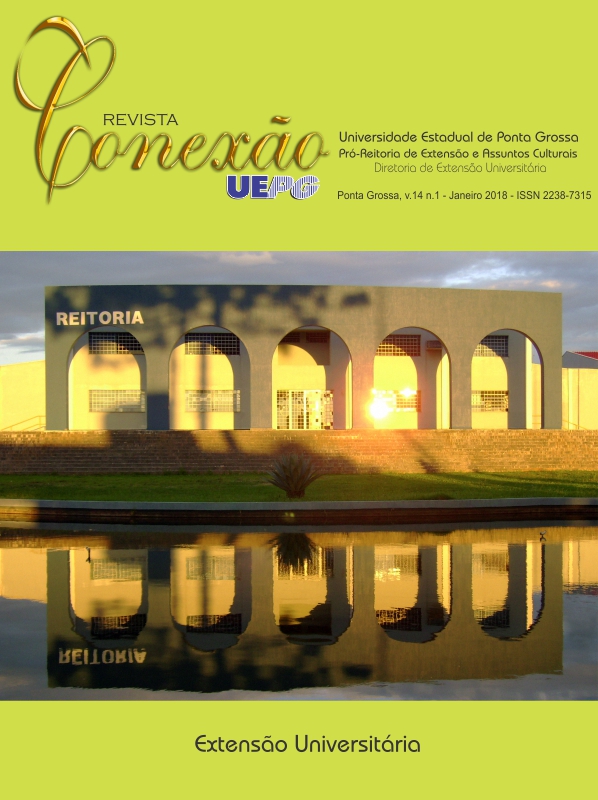EXPERIENTIAL LEARNING OF UNIVERSITY STUDENTS: DIAGNOSIS AND ANALYSIS OF BARRIERS AND STRENGTHS OF TEACHERS OF SECONDARY INSTITUTIONS WITH RESPECT TO ORGAN DONATION
DOI:
https://doi.org/10.5212/Rev.Conexao.v.14.i1.0002Keywords:
Experiential learning, university extension, donation of organs and tissues, vocational training.Abstract
A socio-community problem was addressed in the framework of the Extension Project "Donation of organs: interdisciplinary and multi-centered dialogue of knowledge" (UNLPam, Argentina). The participants were teachers and students from the Faculty of Biological Sciences and from health and social institutions. It used action research methodology that involved students, parents, community members and secondary teachers through workshops in different secondary schools. This study describes the knowledge that teachers have about the subject and the teaching and learning processes that students develop in different social contexts. The teachers' reports indicate that they do not deal with this issue due to the lack of knowledge about the meaning and mechanisms oforgan donation. Besides, it is difficult to them to cope with a topic related to brain death. The extension practices allow the construction of strengths from an approximate approach in order to address the problems in the community.
Downloads
References
BECK, Aaron; RUSH, Jhon; BECK J. Terapia Cognitiva: Conceptos básicos y profundización. Editorial Gedisa. Barcelona, 2000.
BECK, Aaron. Thinking and depression: Theory and therapy._Archives of General Psychiatry, New York: Lyle Stuart, 1964.
ELLIS, Albert. Reason and emotion in psychotherapy._New York: Lyle Stuart, 1962.
CAMILLONI, Alicia. Docencia, investigación y extensión: un vínculo necesario. Cuadernos de extensión universitaria de la UNLPam. EDUNLPam. Santa Rosa, La Pampa, 2015.
CASTRO, Jorge. Orientaciones para la elaboración de Proyectos y Programas de Extensión. Cuadernos de Extensión de la UNLPam. EDULPam. Santa Rosa, La Pampa, 2015.
CONSEJO INTERUNIVERSITARIO NACIONAL. Resolución 692/12.
DI FRANCO, Graciela; OLIVARES Jorge Luis; VILLARREAL Marina; PÉREZ Julieta; OLIVETTO Daniel; ALFONSO Graciela; CHUDOBA Margarita; GÓMEZ, C. Fortaleciendo la formación profesional articulando investigación, docencia y extensión. En Debates y perspectivas de la investigación en las Ciencias Humanas y Sociales. Facultad de Ciencias Humanas – EDULPam, Santa Rosa, La Pampa, 2013.
FREIRE, Paulo. El Grito Manso. 9° edición. Siglo XXI. Buenos Aires, 2014.
FREUD, Sigmund. Consideraciones sobre la guerra y la muerte, 1915. Obras Completas, Tomo II. 1ª ed. 3ª. Reimp. El Ateneo. Buenos Aires, 2008.
KOLB David. Experiential Learning Theory Bibliography 1971-2001. Boston, 2001.
OLIVARES Jorge Luis y DI FRANCO María Graciela. Prácticas de Extensión y Compromiso con Problemas Comunitarios: Donación de Sangre y Órganos. Editores Literarios: EDULPam. Santa Rosa - La Pampa, 2014.
LAZARUS, Richard y Susana FOLKMAN. Estres y procesos cognitivos. Martínez Roca. Barcelona, 1986.
Ley Nacional 24193 de Trasplante, sobre donación de órganos y tejidos.
PÉREZ Maria Angeles; MARTIN, Agustín; GALLEGO, Ana; SANTAMARINA, José. Influencias de algunas variables médicas y psicosociales en la recuperación psicológica de los trasplantado. Futuras líneas de investigación psicológicas”. Revista de Psicopatología y Psicología Clínica, 5 pp.71-87. España, 2000.
PÉREZ SAN GREGORIO, Maria Angeles; RODRIGUEZ Agustín Martín y Antonio Galán. Problemas Psicológicos asociados al Trasplante de Órganos. International Journal of Clinical and Health Psychology. Asociación Española de Psicologia Conductual (AEPC) Pp.99-114. España, 2005.
OLIVARES, Jorge Luis; MORALES, Tamara. Partir de historias académicas para comunicar, resignificar y planificar aprendizajes relevantes. Revista Praxis Educativa, v.17, n° 2, pp.64-71. Miño y Dávila Editores. Buenos Aires, 2013.
OLIVARES, Jorge Luis; OLIVETO, Daniel; MORALES, Tamara. Pedagogía universitaria: experiencias críticas y evaluación integradora, en Pruzzo, V. (compiladora): Las prácticas del profesorado. Mediadores didácticos para la innovación, pp.118-188. Editorial Brujas. Córdoba, 2013.
Organización Panamericana de la Salud (OPS), Resolución CD4 R15/99.
Organización Social de la Salud (OMS); resolución WHA63.12 de la 63.ª ASAMBLEA MUNDIAL DE LA SALUD.
MENIN, Ovide. Algunas ideas sobre formación docente universitaria. En Revista Praxis Educativa, v. 15, n° 15. 14-18, Miño Dávila editores. Buenos Aires, 2015.
RODRIGUEZ MARÍN, Jesús. Psicología de la salud. Madrid: Sintesis Psicológica. En Bermejo, J. C., Magaña, M., Villacieros, M., Carabias, R., & Serrano, I. Estrategias de afrontamiento y resiliencia como factores mediadores de duelo complicado._Revista de Psicoterapia,_88, 85-95, España, 2012.
TENTI FANFANI, Emilio. La escuela y la cuestión social: ensayos de sociología de la educación. Siglo XXI. Buenos Aires, 2007.
TOMMASINO, Humberto; Y STEVENAZZI, Felipe. Reflexiones en torno a las prácticas integrales en la Universidad de la República. Revista +E versión digital, (6), pp. 120-129. Santa Fe, Argentina: Ediciones UNL, 2016.
TOMMASINO, Humberto. Generalización de las Prácticas integrales. Los aportes de la extensión para su implementación. Montevideo, Uruguay, 2000.
Downloads
Published
Issue
Section
License
a) Authors retain copyright and grant the journal right of first publication with the work simultaneously licensed under a Creative Commons Attribution License that allows others to share the work with an acknowledgement of the work's authorship and initial publication in this journal.
b) By submitting an article to the Revista Conexão UEPG and having it approved, the authors agree to assign, without compensation, the following rights to the Journal: the rights of first publication and the rights to redistribute the article and its metadata to the indexing and reference services that the editors deem appropriate.
c) Readers are free to transfer, print out and use the articles published in the Journal, as long as there is always explicit mention to the author(s) and to the Revista Conexão UEPG and as long as there is no alteration of the original work. Any other use of the texts needs to be approved by the author(s) and by the Journal.






